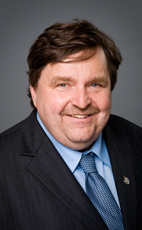Mr. Speaker, I rise to speak to Bill C-20, which would implement a trade agreement with Honduras.
In 2013, when I sat on the Subcommittee on International Human Rights, we studied what was happening in Honduras at length. I believe I know enough of the facts to oppose this bill.
The despotic regime that reigns in Honduras is characterized by its anti-democratic practices, its corruption, its failed institutions and its history of human rights violations.
Canada should not be signing a free trade agreement with that country. I do not understand how some of my colleagues from the other parties dare support such a treaty, considering what we know about Honduras.
In my view, when it comes to considering a trade agreement, we must determine whether the partner respects democracy and human rights. That is absolutely not the case here, as my NDP colleagues demonstrated earlier. I will add to the debate what we learned in the Subcommittee on International Human Rights.
Honduras has a poor record on rule of law, as we know. Human rights are being trampled there. There are many cases of murder and corruption, and they go largely unpunished. Professor Gordon of Wilfrid Laurier University, who testified before the committee, said that the possibility of a free election needs to be called into question. Some members of the opposition parties have been assassinated, others have been threatened and so on.
Violence and repression have reached new highs since the coup in 2009. In 2013, there was an average of 10 killings a month. According to Professor Dana Frank from the University of California, 80% of crimes in Honduras go unpunished. According to the Committee of Relatives of the Disappeared in Honduras, there were more than 10,000 complaints of human rights violations by security forces in 2010. The legal authorities did not follow up on these complaints.
Human Rights Watch published a report in December 2010 that mentioned that the state does not co-operate in investigations. There are widespread doubts about whether there is judicial independence. Another report published in February 2013 criticizes the fact that no progress has been made.
The NGO Freedom House ranks Honduras as the second most dangerous country for journalists. According to the National Human Rights Commission in Honduras, 36 journalists were killed between 2003 and 2013, and 29 have been killed since President Lobo took power.
In June 2013, Anibal Barrow, a TV news anchor, was kidnapped from his car and killed. No suspects were convicted.
Furthermore, a handful of companies with ties to the government own most media outlets. Self-censorship is common. It is alleged that journalists are corrupted and advertisements are manipulated to ensure that coverage is positive and to silence opponents. A recently passed law penalizes anyone for criticizing a company or unfairly criticizing the government. These conditions make it difficult to assess the real situation in the country.
These issues caught the attention of the U.S. Congress last summer. In June 2013, 24 American senators signed a letter to express their concerns about human rights in Honduras. In addition, 94 members of Congress urged the U.S. Department of State to cease all military assistance to Honduras in light of the violent repression.
Furthermore, there has been some criticism of the charter cities that Honduras wants to create. These charter cities would give foreign companies unrivalled and exclusive access to cheap labour and natural resources in Honduras. Basically, they want to create nations within Honduran territory. In all the areas where the charter cities are proposed, there are significant land issues that have been going on for decades.
The most significant area is in the Aguán valley. That area has been allocated for a potential charter city. It is also an area that has seen huge investments in tourism. There has been a significant amount of protest against the charter cities, once again because the communities where these cities will be built are being excluded from any sort of dialogue.
The individual who proposed the charter city project, an economist named Paul Romer, has since pulled out of the process, complaining that there is no accountability or transparency. This has raised a significant amount of controversy in Honduras, and yet the trade agreement we are currently debating seeks to take advantage of those charter cities.
The second criterion to take into account when assessing trade agreements is whether the agreement has any strategic value to Canada. Well, I have no idea, because this agreement was negotiated without any transparency.
Despite repeated requests, the Government of Canada refused to make the text of the agreement public during the negotiation process. I have to wonder how some members of the House can support a trade agreement without knowing the details, especially when we are well aware of the human rights situation in that country.
This agreement is stained with the blood of Hondurans. If we enter into a partnership with such a regime, we run the risk of tarnishing Canada's reputation on the international stage.
In 2011, the people of Brome—Missisquoi elected me to this place with the hope of building a different Canada. Considering the facts that I just outlined, I cannot support Bill C-20, and I encourage anyone who is still undecided to oppose it.

